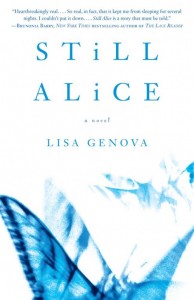 My RRHB has a saying whenever anyone asks him contracting advice about their basements: “you can’t win against water.” This saying kept echoing and echoing through my mind as I read Lisa Genova’s Still Alice last night into the wee hours because the baby woke up at 2AM, and I couldn’t get either to sleep or back to sleep, so I pretty much finished the book in one sitting. The only other Alzheimer’s-related story I’ve read is by Alice Munro, and it’s aching, brilliant and cutting at the same time (“The Bear Came Over the Mountain“) so I sort of expected the same emotional resonance that carried throughout that story to be found in this novel, and I don’t know why, but it’s just not there.
My RRHB has a saying whenever anyone asks him contracting advice about their basements: “you can’t win against water.” This saying kept echoing and echoing through my mind as I read Lisa Genova’s Still Alice last night into the wee hours because the baby woke up at 2AM, and I couldn’t get either to sleep or back to sleep, so I pretty much finished the book in one sitting. The only other Alzheimer’s-related story I’ve read is by Alice Munro, and it’s aching, brilliant and cutting at the same time (“The Bear Came Over the Mountain“) so I sort of expected the same emotional resonance that carried throughout that story to be found in this novel, and I don’t know why, but it’s just not there.
Alice, the title character, starts having strange episodes involving her memory. She’s a “brilliant” psychology professor at Harvard who has devoted her life to understanding linguistics, and her equally brilliant scientist of a husband might just cure cancer (honestly); the two share a wonderful life, three equally brilliant kids, and a whole host of truly awful dialogue as the episodes become diagnosed as early-onset Alzheimer’s. I know the book jacket tells me this is an award-winning NY Times bestseller but, for the life of me, I couldn’t understand why. It honestly read more like a really bad Lifetime movie of the week in parts, and I couldn’t abide by the melodrama.
That said, the extraordinarily cool exterior and tone of this novel, while it didn’t humanize any of the characters for me, did work well when it came to an experiential understanding of the disease. The book doesn’t shift perspective and is actually quite smart about how it narrates Alice’s loss of memory — she can’t win against the water, and the tide will eventually wash away every little bit of her — Genova does this exceptionally well. There’s a great scene at a Christmas party where Alice meets the new wife of her graduate student. She’s wearing a long, red dress. They are introduced, they share a conversation, and then Alice gets another glass of wine. When she returns, she notices a woman there in a red dress, but nothing else clues in — she has absolutely no recollection of who the woman was nor her having met her just moments before. I really liked this aspect of the narrative. As Alice’s mind deteriorates, we see and hear her world completely disappear. She no longer recognizes her children, her husband, her grandchildren, and it’s an amazing point of view into a disease that’s claiming more and more people as our population both increases and ages.
But, overall, I found Alice the character hard to like: she’s shrill, opinionated, stubborn and honestly kind of annoying. There’s a ridiculous bit of “conflict” between Alice and her husband but as this whole book feels like “telling” rather than “showing,” you never get a true sense of their relationship. In fact, you never get a sense that any of the characters are fully drawn, and that disappointed me as, like I said, I enjoyed the narrative structure of this book so much. Anyway, it’s another one off the shelf, right?
I bought this at the end of the spring after I finish Michael Ignatieff’s Scar Tissue. Hope to find a chance to read it soon.